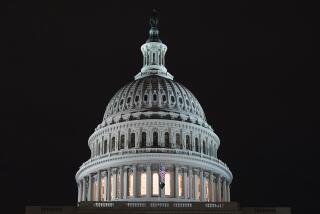Democrats many maneuver around GOP filibuster on healthcare legislation
- Share via
WASHINGTON — Senior Democrats have reached broad agreement on a plan to prevent Republicans from blocking President Obama’s sweeping healthcare proposals, congressional officials said Friday.
The plan, which would use special provisions of the budget process to prevent a Senate filibuster, threatens to sow outrage among Republican lawmakers and could complicate Democrats’ efforts to push through the rest of their agenda. But Obama and his allies believe their decision to use the “budget reconciliation” process will allow passage of the kind of health system overhaul that has eluded Washington.
The president reiterated that position Thursday night in a meeting with congressional leaders, according to officials in the White House and on Capitol Hill.
Adding healthcare to the list of measures that will be treated as part of the budget resolution process would allow Democrats to pass the legislation with 51 votes in the Senate instead of the 60-vote supermajority normally required to avoid a filibuster.
With a big Democratic majority in the House and Democrats controlling at least 58 seats in the Senate, the move would all but guarantee that a single GOP vote would not be needed.
Democrats hope to approve the budget resolution as early as next week, although the specifics of a healthcare plan will take months to work out.
With Senate Democrats talking through final details of the legislative strategy, lawmakers said there was broad agreement to invoke the budget reconciliation process to circumvent a filibuster if the two parties have not reached agreement on a healthcare bill by September.
“We are hopeful we will be able to complete work next week,” Senate Budget Committee Chairman Kent Conrad (D-N.D.) said in a statement Friday, adding that there was still “a fair amount of work to be done.”
Under the budget deal, Obama still would need 60 votes to pass his plans to fight global warming, although he has a trump card on climate change: the ability to regulate greenhouse gas emissions through the Environmental Protection Agency.
Senate Minority Leader Mitch McConnell (R-Ky.) warned against the move to limit GOP power.
“Fast-tracking a major legislative overhaul such as healthcare reform . . . without the benefit of a full and transparent debate does a disservice to the American people,” he said. “And it would make it absolutely clear they intend to carry out their plans on a purely partisan basis.”
Speaking to reporters Friday morning, Senate Finance Committee Chairman Max Baucus (D-Mont.), who is drafting healthcare legislation, sought to play down partisan tensions.
“An awful lot of Republicans really want to do significant healthcare reform,” Baucus said, stressing that he hoped Democrats would not have to use reconciliation.
“If we don’t use reconciliation, we are going to have a much more sustainable result,” he said. “When we jam something down someone’s throat, it’s not sustainable.”
Among the most arcane legislative maneuvers, budget reconciliation was established to streamline the federal budgeting process by specifying spending targets for legislation; Congress should stay close to the budget goals as it drafts the specific bills named in the resolution. Since those bills are not subject to filibuster, using the provision has long been among the most controversial steps authorized in congressional rules.
All 41 Senate Republicans sent a letter to Democratic leaders stating that the tactic “violates the principle of bipartisanship to which President Obama and congressional leaders have publicly committed.”
In the early 1990s, senior Senate Democrats prevented President Clinton from using the tactic to push through his healthcare agenda, which ultimately collapsed. This year, Conrad and Baucus argued vociferously against doing likewise.
The budget resolution passed by the Senate three weeks ago did not include reconciliation language. But House Democrats, noting that Republicans used the tactic to push through tax cuts when they were in the majority, included it in their budget resolution. And Obama and his aides promoted the idea in their conversations with lawmakers.
Thursday night, the president bluntly told McConnell that though he wanted to work with Republicans, he would not tolerate any delays in the push for a healthcare overhaul, according to a White House official who was in the meeting but was not authorized to speak on the record.
Senior Democrats have stressed that the September deadline should encourage Republicans to work with them in coming months.
The reconciliation instructions in the budget resolution may also make it far more likely that several controversial Democratic healthcare priorities end up in the final bill, said Diane Rowland, executive vice president of the nonpartisan Henry J. Kaiser Family Foundation, a leading voice in healthcare policy.
That includes the creation of a government program to cover some of the roughly 46 million people without coverage and new limits on private insurers that contract with Medicare.
But, Rowland said, the tactic also substantially increases the likelihood that Obama will succeed in pushing through a significant healthcare bill.
“It may not be the most effective way to build bipartisan consensus,” she said. “It may be the most effective way to get such a large bill passed.”
--
Peter Nicholas and Jim Tankersley in the Washington bureau contributed to this report.
More to Read
Get the L.A. Times Politics newsletter
Deeply reported insights into legislation, politics and policy from Sacramento, Washington and beyond. In your inbox twice per week.
You may occasionally receive promotional content from the Los Angeles Times.











